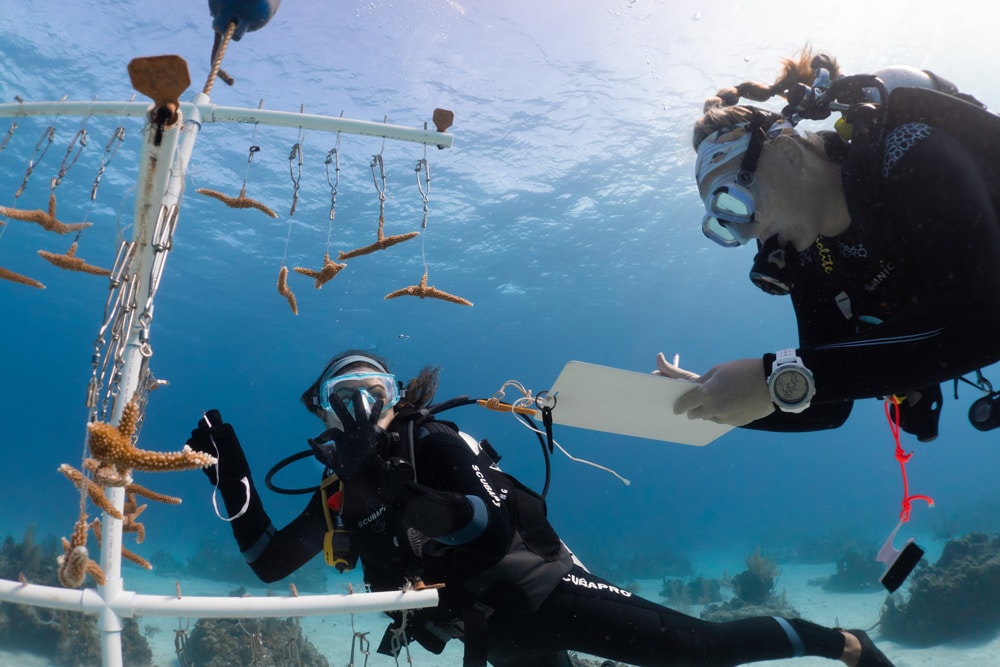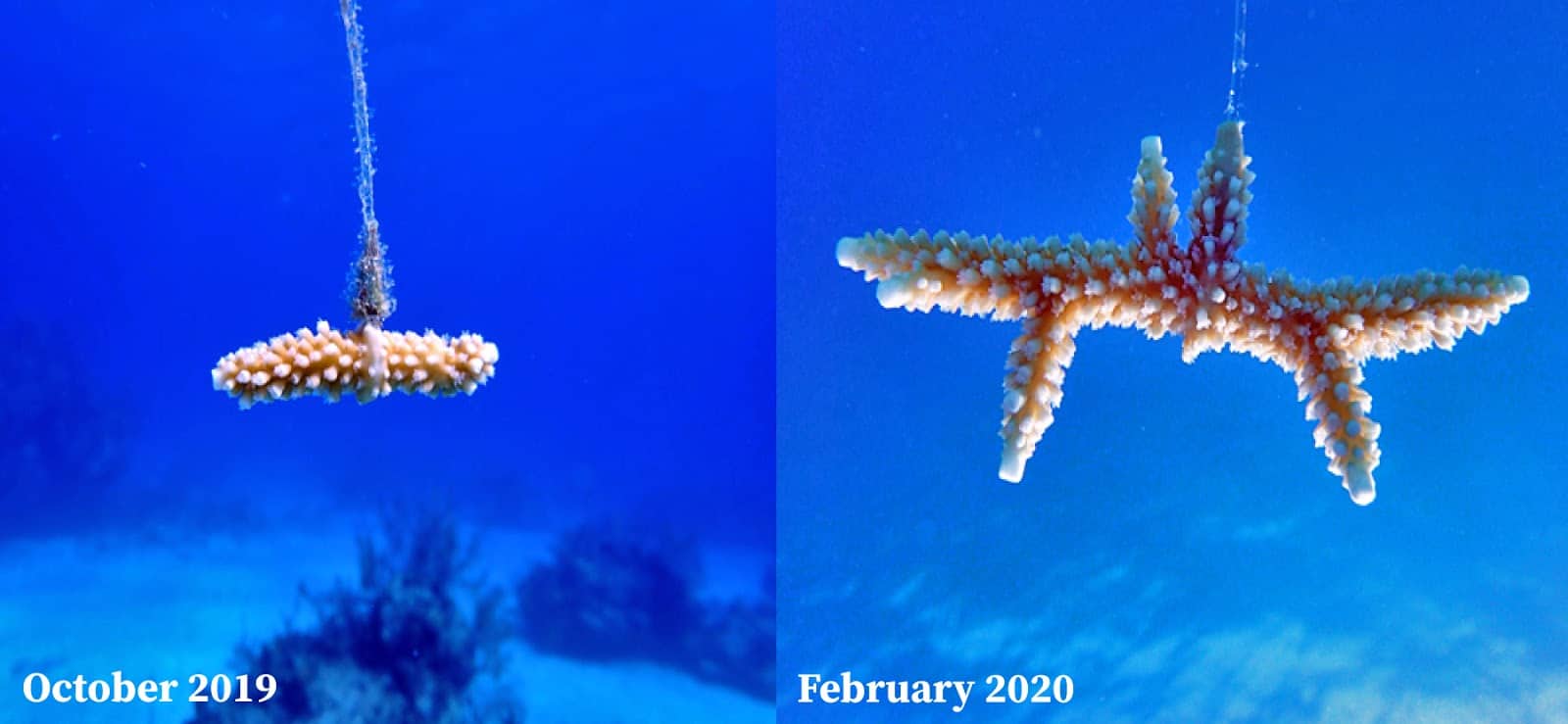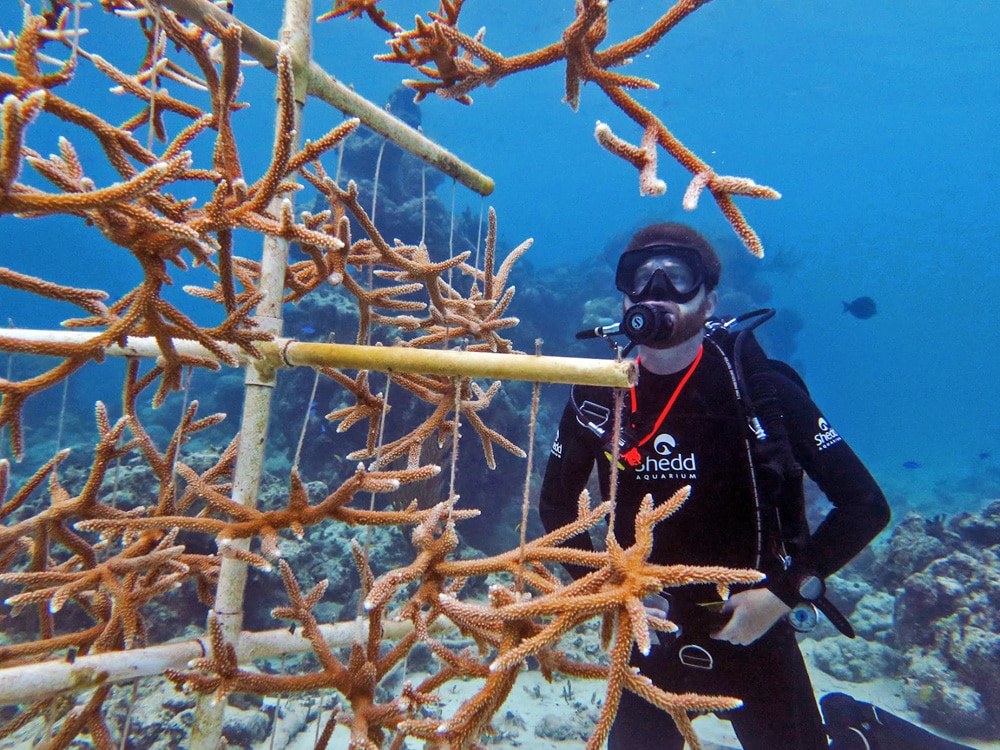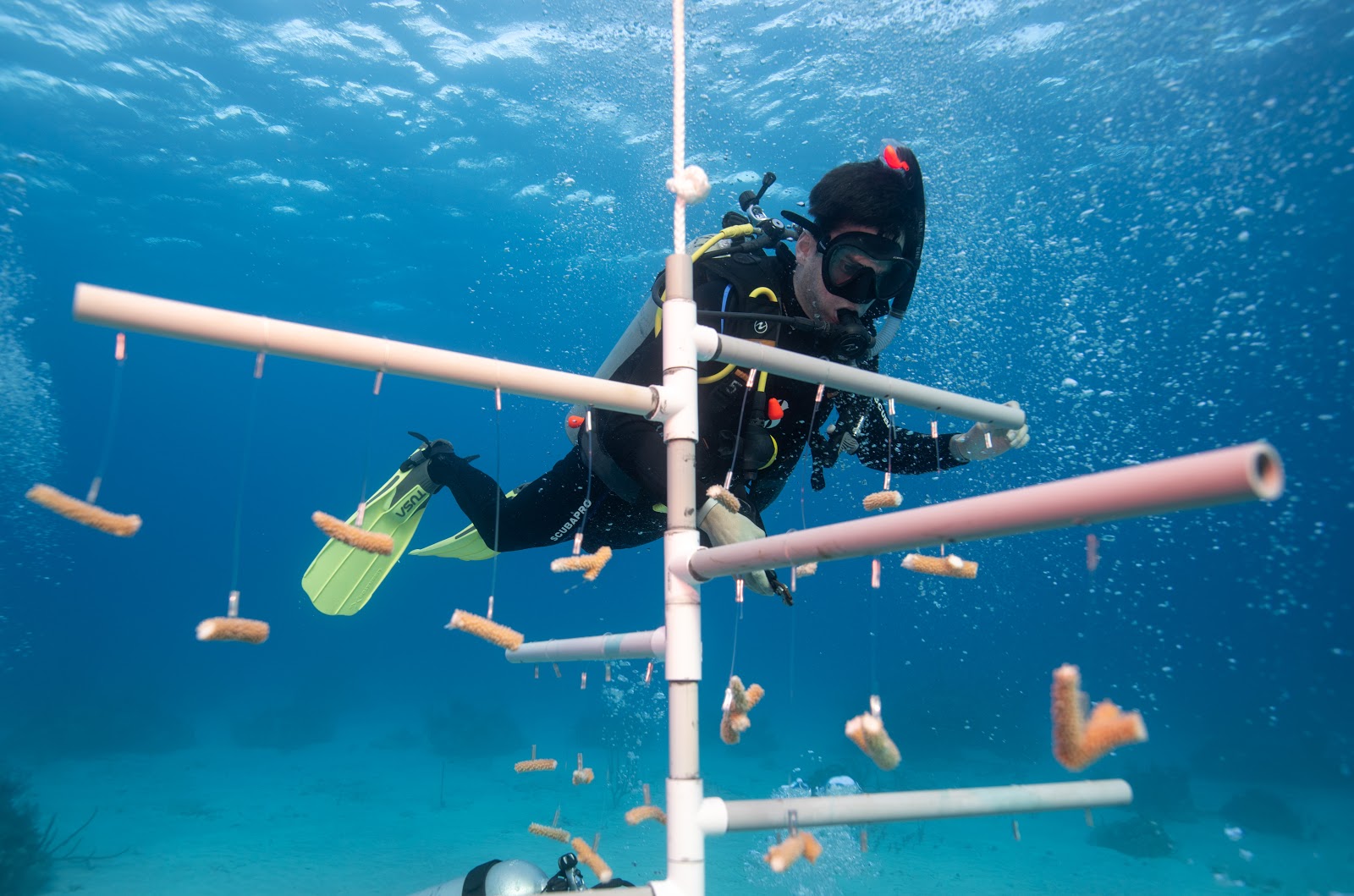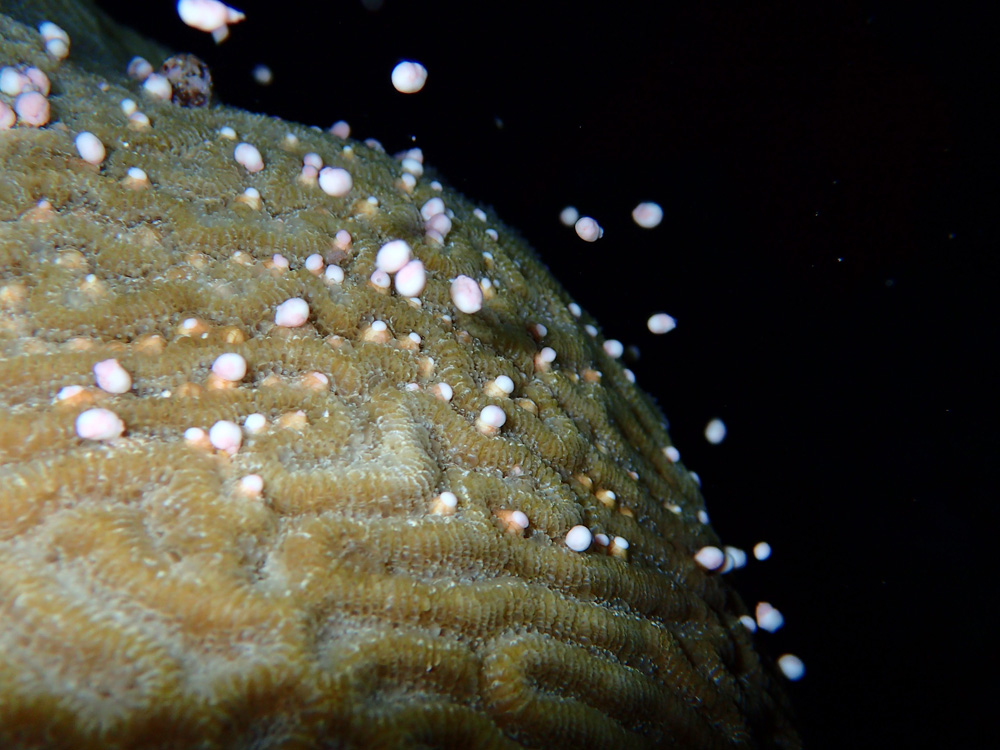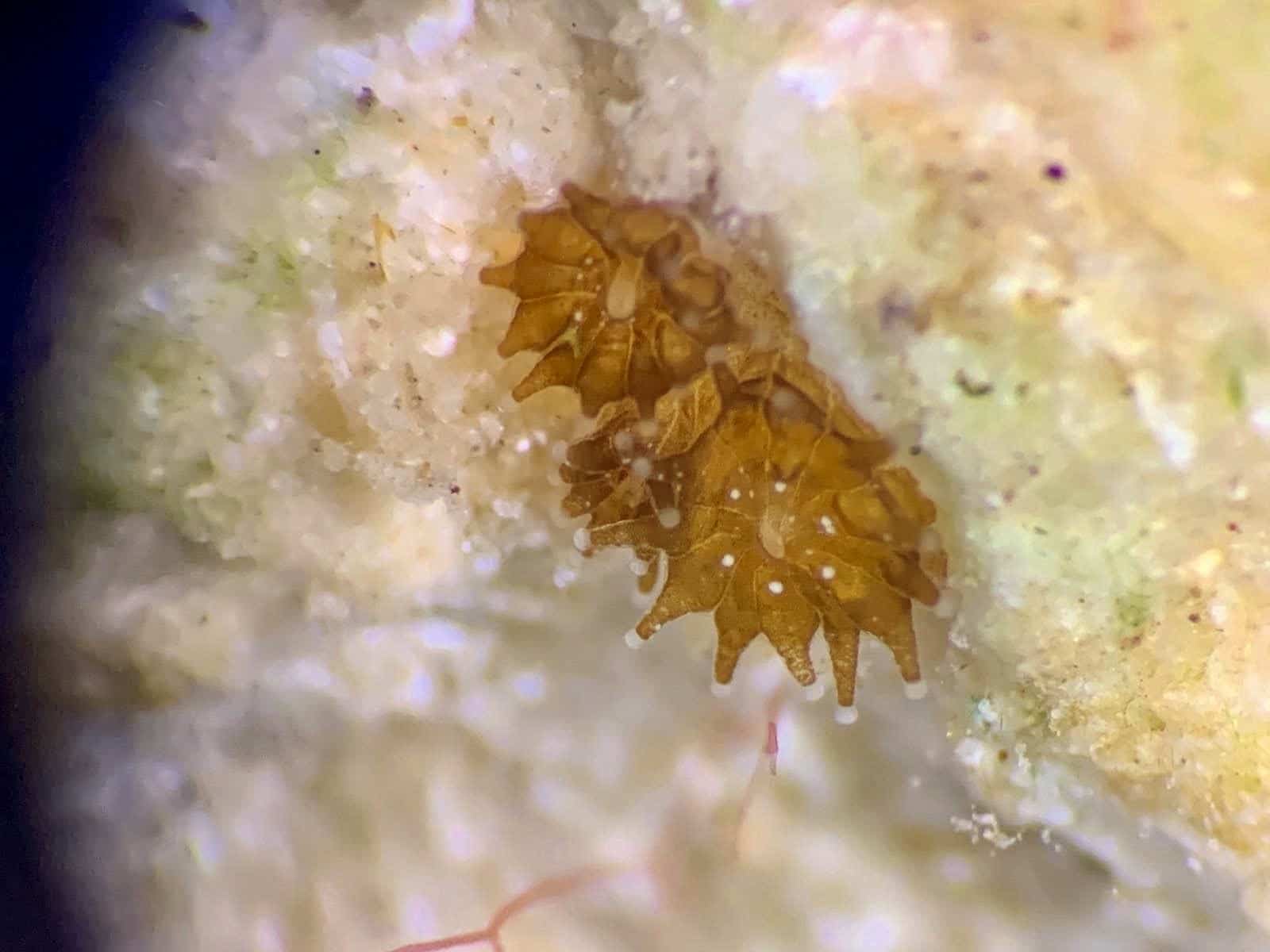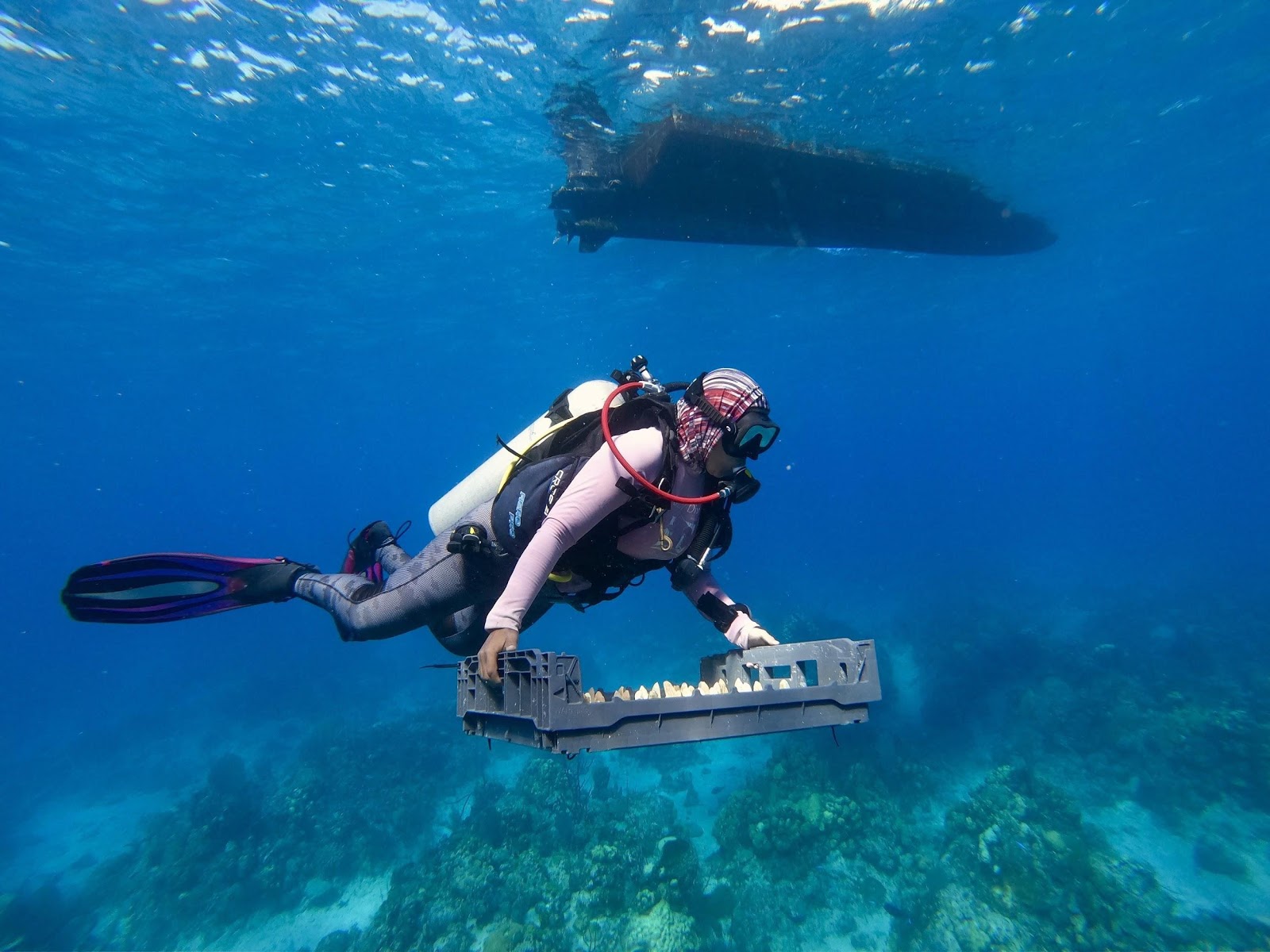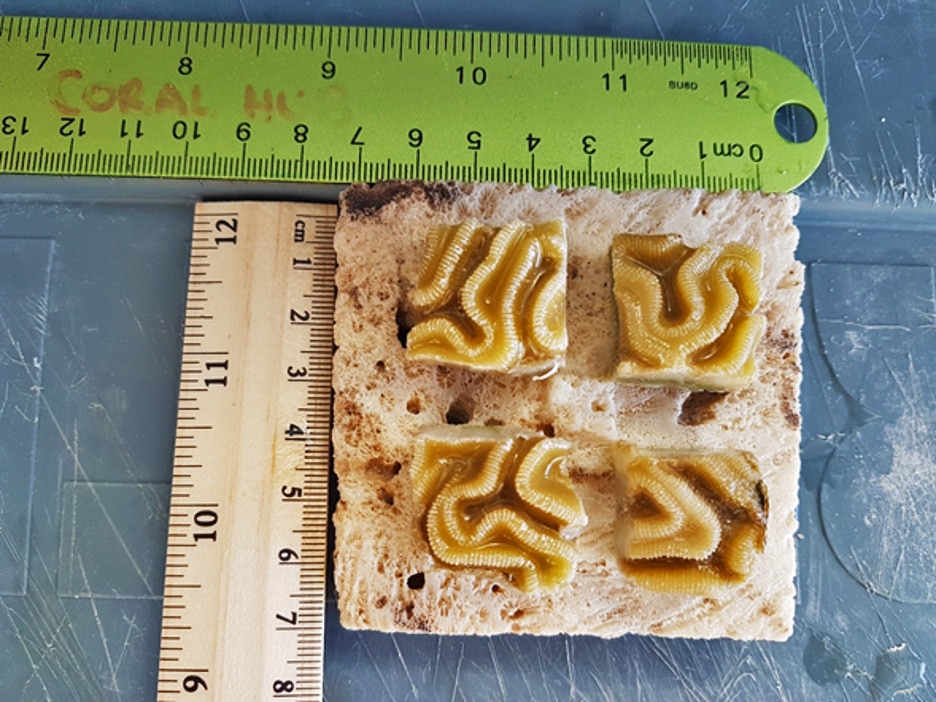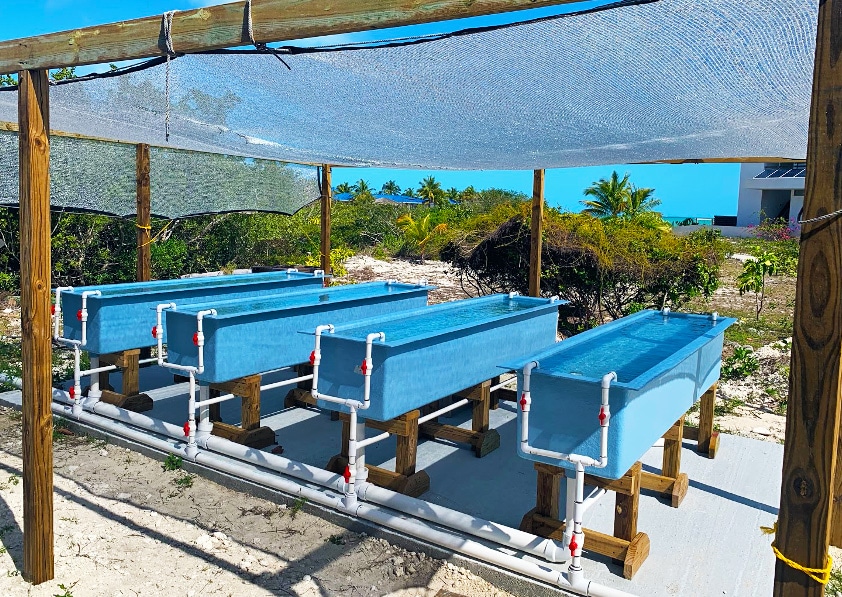Marine Life & Conservation
Reversing the decline of Bahamian reefs
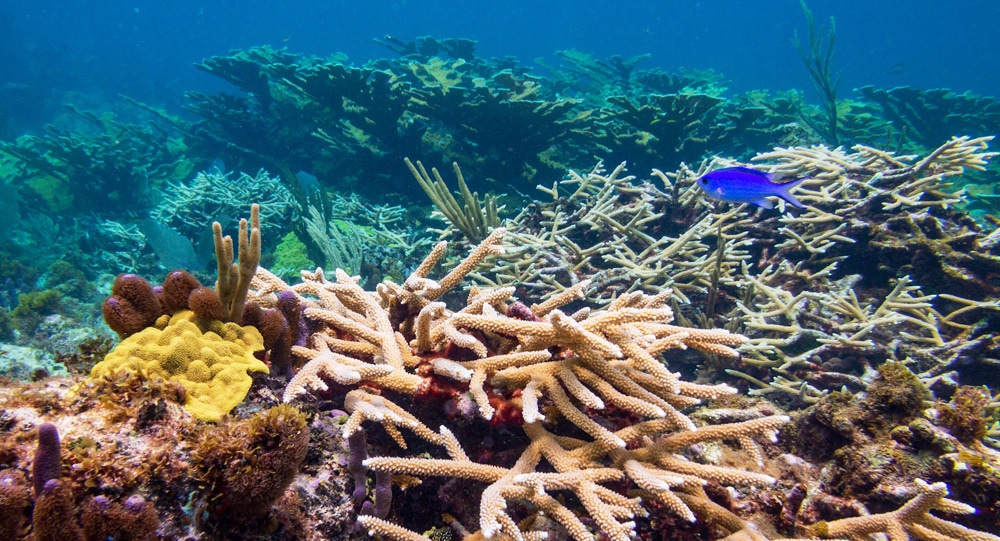
I recently got in touch with the Cape Eleuthera Institute in The Bahamas to ask about their work on coral reef conservation. I was delighted to “meet” Natalia Hurtado, MSc., Coral Reef Research Associate at PIMS/CEI & Casey Harris, MSc., Coral Reef Research Associate at PIMS/CEI. THis is what they had to say about their important work.
Much like coral reefs worldwide, coral populations in The Bahamas are declining at alarming rates, making coral restoration more vital to preserve marine resources and local economies. The Bahamas Coral Innovation Hub located in Eleuthera, The Bahamas is a collaboration between the Cape Eleuthera Institute (CEI), Perry Institute for Marine Science (PIMS), and The Nature Conservancy (TNC). With our work, we hope to facilitate the recovery of degraded Bahamian reefs and enhance coral population resilience.
One major problem facing coral reefs worldwide is that coral abundance is decreasing due to both local and global threats, making it difficult for corals to maintain genetic diversity on the reef. At the same time, their ecosystem services are deteriorating, affecting human livelihoods and the diversity of marine species that rely on them. At the Coral Innovation Hub, we focus our restoration efforts on 3 main areas of research: nursery-reared coral fragments, larval propagation, and coral microfragmentation. We are also dedicated to student involvement in our research, with the goal of inspiring younger generations to pursue careers in marine conservation. All projects at the Coral Innovation Hub are led by Natalia and Casey.
Nursery Establishment to Improve Genetic Diversity
Corals can reproduce asexually, in which they undergo a strategic life-history trait called “fragmentation”, where pieces of coral can break off from disturbance and then attach to the substrate to form a whole new colony. We can take advantage of this natural process to grow corals at a much faster rate and plant them back on degraded reefs. We do this by growing corals in a mid-water tree structure, which is made with PVC and tethered to the sea floor, where corals are suspended away from sediment and predators. Below is a picture of Researcher Casey Harris taking notes of coral sizes while an assistant is taking measurements.
The establishment of coral nurseries is an important step to keep coral fragments safe while they grow. Caribbean branching corals grow extremely fast and increase in size about 10-20 cm (4-9 in) per year compared to large boulder species, which only grow about 1-2 cm (<1 in) per year. This is great for restoration efforts because after one year of growing in the nursery, branching corals can be outplanted back on the reef.
We are currently running a project with Dr. Ross Cunning (pictured below) at Shedd aquarium and the Reef Rescue Network, where we are investigating the resilience of staghorn corals by spreading different genotypes across The Bahamas to increase genetic diversity within coral nurseries. We have 19 staghorn genotypes that were collected and moved between existing nurseries and wild populations throughout a few Bahamian Islands in October 2019. Increasing genetic diversity within coral nursery projects is important because some genetically distinct individuals may be better suited to withstand environmental stress than others. Having as many different genotypes as possible is essential to successful restoration outcomes.
During a 15-day expedition onboard the Shedd Aquarium research vessel R/V Coral Reef II, 570 staghorn corals were distributed between newly established nurseries located in Bimini, Nassau, Cat Island, and Eleuthera. In each location, coral growth has been monitored by our partners and they are thriving in their new locations.
Student Involvement as Reef Rescue Divers
The Coral Innovation Hub at CEI works closely with Island School students and visiting educational groups from different ages and backgrounds. These students have a unique opportunity to complete a PADI Reef Rescue Diver Specialty Course. This course was developed by Hayley-Jo Carr, Training Director & Coordinator of the Reef Rescue Network, and Dr. Craig Dahlgren, Executive Director of PIMS. The Reef Rescue Diver Specialty and Reef Rescue Network were both created by PIMS, with the goal of rehabilitating coral reefs by working with various partners to establish a network of coral nurseries around The Bahamas and other parts of the Caribbean.
During the course, students learn about the value of coral reefs and restoration, different types of nurseries, how to maintain nurseries, coral fragmentation, outplanting and monitoring. They work with Critically Endangered species, such as elkhorn and staghorn coral, that were once abundant on Caribbean reefs but have rapidly declined since the 1980s. We target these species for restoration because they play an important ecological role on the reef by providing high rugosity and three-dimensional functionality that protects our shorelines and provides shelter for marine life.
Implementing Larval Propagation as a Restoration Technique
Corals can also reproduce sexually. In sexual reproduction, corals release “spawn” (egg and sperm) and can synchronize their spawning events with colonies of the same species. Pictured below are the gamete bundles of a brain coral, in which the coral releases both egg and sperm (male and female gametes). We can take advantage of these spawning events to collect their spawn and cross fertilize them to increase genetic diversity, and study the vulnerable early life-history stages of corals.
During summer 2019, Coral Innovation Hub researchers collected coral gametes and saw high rates of fertilization and settlement success, with over 5,000 Orbicella faveolata (mountainous star coral) recruits (coral babies pictured below) settled on SECORE Seeding Units (concrete and ceramic substrates).
We are allowing juvenile corals to grow in an offshore nursery tree and outplanted more than 1,000 substrates with coral recruits onto the reef. The goal is to determine if initial and long-term coral survivorship is possible in an offshore nursery and/or on the reef. This research was conducted during SECORE’s International Coral Spawning and Propagation Workshop hosted at CEI with PIMS and TNC. Below is a picture of Researcher Natalia Hurtado carrying substrates to be outplanted on the reef.
A New Restoration Technique for Boulder Corals
Another way to grow corals through asexual reproduction is by using a new restoration technique for slow-growing boulder species called “microfragmentation,” founded by Dr. David Vaughan, Plant a Million Corals. This process consists of cutting fragments of the same colony into small pieces (1-3 cm, pictured below), using a specialized saw. The clone fragments will recognize each other and fuse together, growing 25-50 times faster than normal.
At the Coral Innovation Hub, we plan to run pilot experiments on different coral species to document the most successful microfragmentation methods needed to upscale our efforts. As part of our study, we will examine the survivorship and growth of microfragmented boulder corals (brain corals, star corals, etc.) in our land-based wetlab facility (pictured below). If proven successful, we will grow boulder corals in an offshore table nursery or directly outplant microfragments to the reef.
Want to know more about Reef Rescue Network? Please contact Hayley-Jo Carr. If you have any questions or want to get involved with The Bahamas Coral Innovation Hub project, please contact Natalia Hurtado or Casey Harris.
Blogs
The Ocean Cleanup Breaks 10,000,000 KG Barrier

The Ocean Cleanup, the global non-profit project, has removed a verified all-time total of ten million kilograms (22 million lbs.) of trash from oceans and rivers around the world – approximately the same weight as the Eiffel Tower.
To complete its mission of ridding the oceans of plastic, The Ocean Cleanup uses a dual strategy: cleaning up the Great Pacific Garbage Patch (GPGP) to remove the plastic already afloat in the oceans, while stopping the flow of plastic from the world’s most polluting rivers.
Through cleaning operations in the GPGP and in rivers in eight countries, the cumulative total of trash removed has now surpassed ten million kilograms. This milestone demonstrates the acceleration of The Ocean Cleanup’s impact, while underlining the astonishing scale of the plastic pollution problem and the need for continued support and action.
While encouraging for the mission, this milestone is only a staging point: millions more tons of plastic still pollute our oceans and The Ocean Cleanup intends to continue learning, improving and innovating to solve this global catastrophe.
This announcement comes as governments from around the world meet to continue negotiations to develop a new legally binding instrument to end plastic pollution at INC4 in Ottawa, Canada. Representatives of The Ocean Cleanup will be in attendance and the organization will be urging decision-makers to collaborate towards a comprehensive and ambitious global treaty which addresses plastic at all stages of its life cycle and in all marine environments worldwide, including in areas beyond national jurisdiction.
It is encouraging to see that the need for remediation is reflected in the various options for potential treaty provisions. It is essential that the final treaty contains clear targets for the remediation of legacy plastic pollution, and reduction of riverine plastic emissions.
Tackling plastic pollution requires innovative and impactful solutions. The treaty should therefore incentivize the innovation ecosystem by fostering innovations that make maximal use of data, technology and scientific knowledge – such as those designed and deployed by The Ocean Cleanup.
‘After many tough years of trial and error, it’s amazing to see our work is starting to pay off – and I am proud of the team who has brought us to this point.’ said Boyan Slat, Founder and CEO of The Ocean Cleanup. ‘While we still have a long way to go, our recent successes fill us with renewed confidence that the oceans can be cleaned.’
The Ocean Cleanup was founded in 2013 and captured its first plastic in 2019, with the first confirmed catch in the GPGP coming soon after the deployment of Interceptor 001 in Jakarta, Indonesia. After surpassing one million kilograms of trash removed in early 2022, the non-profit project has since progressed to the third iteration of its GPGP cleaning solution, known as System 03, and a network of Interceptors currently covering rivers in eight countries, with more deployments set for 2024.
About The Ocean Cleanup
The Ocean Cleanup is an international non-profit organization that develops and scales technologies to rid the world’s oceans of plastic. They aim to achieve this goal through a dual strategy: stemming the inflow via rivers and cleaning up the legacy plastic that has already accumulated in the ocean. For the latter, The Ocean Cleanup develops large-scale systems to efficiently concentrate the plastic for periodic removal. This plastic is tracked and traced through DNV’s chain of custody model to certify claims of origin when recycling it into new products. To curb the tide via rivers, The Ocean Cleanup has developed Interceptor™ solutions to halt and extract riverine plastic before it reaches the ocean. Founded in 2013 by Boyan Slat, The Ocean Cleanup now employs a broadly multi-disciplined team of approximately 140. The foundation is headquartered in Rotterdam, the Netherlands.
For more information, visit: theoceancleanup.com and follow @theoceancleanup on social media.
Marine Life & Conservation
Steve Backshall to headline Shark Trust’s flagship event: For the Love of Sharks

Join a host of amazing, shark loving, speakers including Steve Backshall and the Shark Trust team for an evening celebrating shark conservation at the Royal Geographical Society in London this November.
Date: 29th November 2024
Time: 6-10pm
Location: Royal Geographical Society, London
Tickets: https://www.sharktrust.org/Event/flos24
The event will be a celebration of all things shark. Those lucky enough to get hold of tickets will hear from engaging guest speakers with a passion for sharks.
The line-up includes (*subject to change if unforeseen circumstances arise)
Steve Backshall: One of television’s busiest presenters, BAFTA award-winning wildlife expert Steve has been passionate about the wild world ever since he was young.
Steve’s impressive TV career has taken him all around the world, investigating a wide array of species and environments. Steve has filmed over 100 hours of children’s wildlife programmes with the BAFTA award winning Deadly 60 franchise and recently, with Sky Nature, for his new series ‘Whale with Steve Backshall’. He has been a patron for the Shark Trust for 10 years.
Simon Rogerson: is a photojournalist specialising in natural history, diving and the sea.
He is editor of SCUBA magazine, the official journal of the British Sub-Aqua Club. Simon started his career as a crime reporter but gravitated towards his ‘less depressing’ interest in underwater exploration, joining the staff of DIVE magazine in 1999. In 2005 he was named ‘Editor of the Year’ in the PPA’s Independent Publishing Awards. Simon also works as a freelance writer, contributing frequently to the Sunday Times and Telegraph, in addition to BBC Wildlife, Esquire, and a host of international diving magazines. He is the author of a book, Dive Red Sea, published by Ultimate Sports. Now based in Berkshire, Simon has been a Patron of the Shark Trust for 20 years.
More speakers to be announced soon. Head to the Shark Trust website to learn more.
The evening will also allow guests the final chance to see the Oceanic 31, shark art exhibition. Some of the artwork will be auctioned/raffled at the event, while the rest will be auctioned online to raise money for the Shark Trust Oceanic Programme.
For the Love of Sharks is an evening with something for everyone who is interested and fascinated by sharks. Join the Shark Trust, their Patrons, Trustees and Staff, along with a host of supporters for this celebration of shark conservation.
For more information or to buy a ticket: https://www.sharktrust.org/Event/flos24
-

 News3 months ago
News3 months agoCapturing Critters in Lembeh Underwater Photography Workshop 2024: Event Roundup
-

 Marine Life & Conservation Blogs3 months ago
Marine Life & Conservation Blogs3 months agoCreature Feature: Swell Sharks
-

 Blogs2 months ago
Blogs2 months agoMurex Resorts: Passport to Paradise!
-

 Gear Reviews3 weeks ago
Gear Reviews3 weeks agoGEAR REVIEW – Revolutionising Diving Comfort: The Sharkskin T2 Chillproof Suit
-

 Blogs2 months ago
Blogs2 months agoDiver Discovering Whale Skeletons Beneath Ice Judged World’s Best Underwater Photograph
-

 Gear Reviews3 months ago
Gear Reviews3 months agoGear Review: Oceanic+ Dive Housing for iPhone
-

 News2 months ago
News2 months agoPADI Teams Up with Wellness Brand Neuro to Drive Ocean Change and Create a Blue State of Mind
-

 Marine Life & Conservation2 months ago
Marine Life & Conservation2 months agoSave the Manatee Club launches brand new webcams at Silver Springs State Park, Florida


